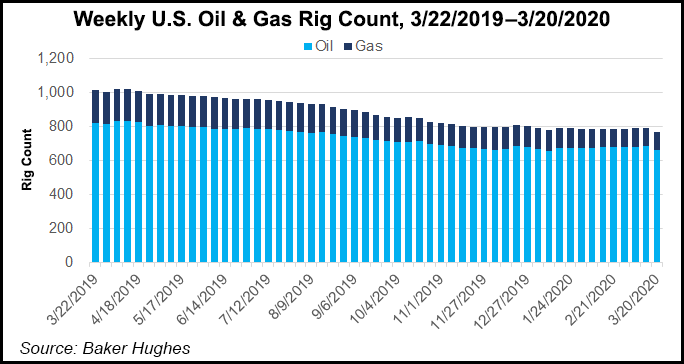Shale Daily | Coronavirus | E&P | NGI All News Access
Deluge of North American E&Ps, OFS Operators Slash Spending as Demand Crushed from Coronavirus
Chevron Corp. led the way by oil and natural gas producers on Tuesday in announcing huge cuts to capital spending this year, with Marcellus Shale operator Antero Resources Inc. and Permian Basin-focused Laredo Petroleum Inc. also pulling back as the North American energy industry attempts to regroup amid a pandemic and an oil price war.

The announced reductions by the exploration and production (E&P) sector, which include Calgary’s Husky Energy among several Canadian operators, mirror the severe capital expenditure (capex) cuts to date by the oilfield services sector, which on Tuesday added Schlumberger Ltd., FTS International Inc. (FTSI) and Precision Drilling Corp.
San Ramon, CA-based Chevron is reducing capex by 20% across the portfolio, with most of the upstream reductions in the Permian. The revamped plan now puts Permian output by year’s end at 125,000 boe/d, or 20% below initial guidance.
The reduction to $16 billion in capex includes a $2 billion cut in unconventional spending, mostly in the Permian. Another $700 million has been sliced from upstream projects, with $500 million struck from the upstream base business across the U.S. and international assets. In addition, $800 million is being cut from the downstream and chemicals budget.
CEO Michael Wirth said the supermajor is “resilient and positioned to withstand this challenging environment. Given the decline in commodity prices, we are taking actions expected to preserve cash, support our balance sheet strength, lower short-term production and preserve long-term value.”
Chevron’s cash capital and exploratory expenditures are expected to decrease by $3.3 billion to $10.5 billion in 2020. Total spending in the second half of the year is forecast at about $7 billion, an annual run rate 30% lower than the approved budget announced in December. In addition, Chevron has suspended share repurchases, which this year had been set at $5 billion. It bought $1.75 billion of shares in the first three months.
“Recent decreases in commodity prices, as a result of Covid-19 impacts on reduced demand and geopolitical pressures increasing supply, are expected to negatively impact the company’s future financial and operating results,” Chevron management said. “Due to the rapidly changing environment, there continues to be uncertainty and unpredictability around the impact on our results, which could be material.”
At Houston’s Phillips 66, capex has been cut by $700 million to $3.1 billion. In the midstream unit, the Red Oak Pipeline and Sweeny Frac 4 projects, as well as Phillips 66 Partners’ Liberty Pipeline all have been deferred.
The partnership also has postponed a final investment decision on ACE Pipeline. Phillips 66 said partner DCP Midstream also is not expected to exercise its option to participate in the Sweeny Fracs 2 and 3 this year.
In addition, share repurchases also have been suspended.
Also announcing capex cuts on Tuesday was Antero, a major producer in Appalachia. Antero has cut spending to $1 billion from $1.15 billion for the year, it said in a filing.
Laredo has reduced its 2020 capital budget overall by 36%, to $290 million, including a 55% decrease in the last nine months. Completions operations are to be suspended in early May through the rest of the year. The operated rig count for 2020 is falling to one from four by June.
“We are moving quickly to stop most of our drilling and completions operations for the remainder of 2020,” CEO Jason Pigott said. “Our longstanding strategy of maximizing flexibility by limiting long-term service contracts, maintaining a strong hedge position and prioritizing a solid balance sheet with no near-term debt maturities enables us to scale back operations and preserve the financial strength to weather a decline in oil prices.”
To preserve the recently acquired locations in West Texas, Laredo plans no more wells this year in Howard County and plans to build a drilled but uncompleted well inventory to await a “more favorable commodity price environment.”
Meanwhile, FTSI, which does completions and fracture (frack) work across the Lower 48, has furloughed crews and support staff that no longer have scheduled work. Executive salaries have been cut by 25% on top of a 15% reduction already in place this year. And stage bonuses and travel time pay for crews have been cut, while bonuses have been suspended for some staff.
“Just over two weeks ago, our business was growing and we had a full frack calendar,” said CEO Michael Doss. “However, in response to current conditions, many of our customers have already dropped fleets or will be dropping fleets over the next couple of months. Pressure pumping companies like FTSI are also giving price concessions that are expected to significantly reduce margins across the industry. Accordingly, we have initiated aggressive measures to reduce costs and position us for future success.
“Low oil prices combined with limited, if any, access to capital has ensured that our customers are reacting quicker than ever before. In return, our response must also be quick and decisive to ensure we adapt to the changing environment. The steps we have taken this week are difficult, but necessary.”
Precision, which works across North America, is reducing its 2020 capex plan by half to $48 million. Precision is also taking measures to enhance free cash flow by cutting the CEO and board compensation salaries by 20%.
Executive officer salaries at Precision are being reduced by 10%. It also plans to lay off staff.
“The company expects these fixed cost reduction measures will reduce annualized fixed costs by over 30%,” including up to a $30 million reduction in general/administrative expenses.
© 2024 Natural Gas Intelligence. All rights reserved.
ISSN © 2577-9877 | ISSN © 2158-8023 |
